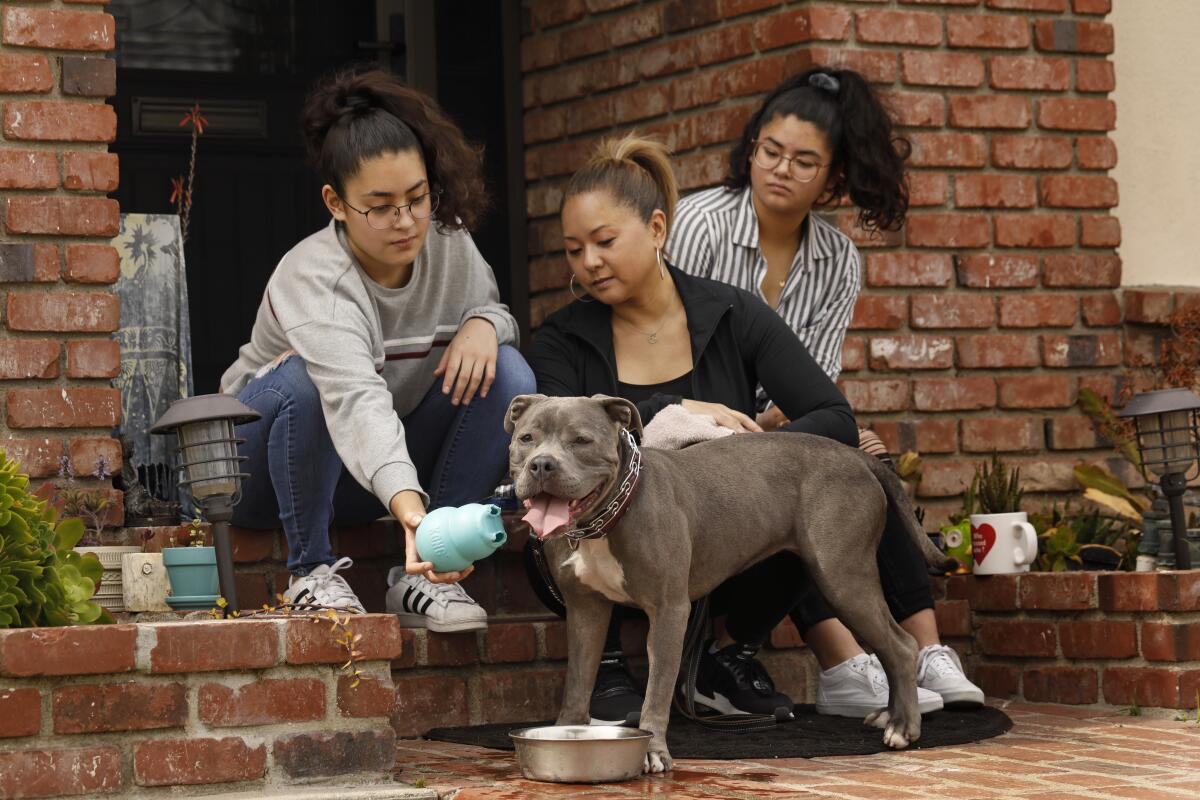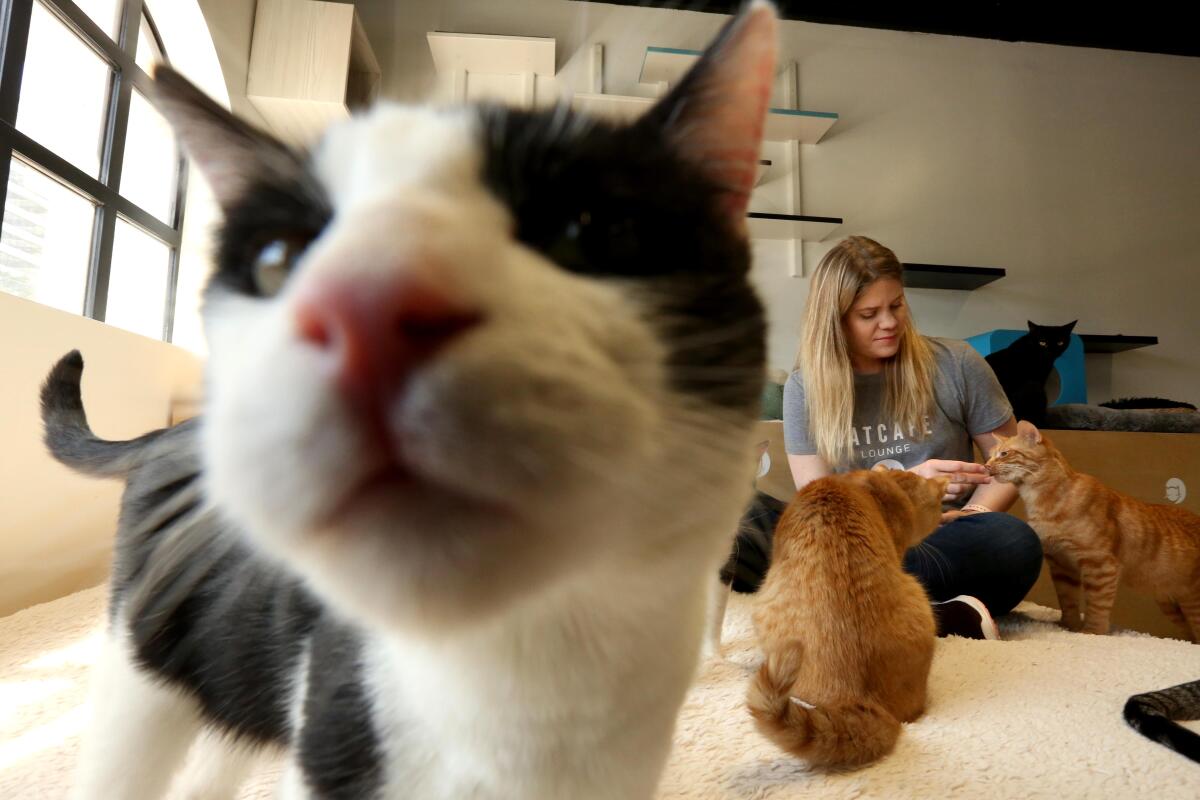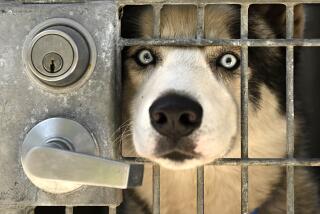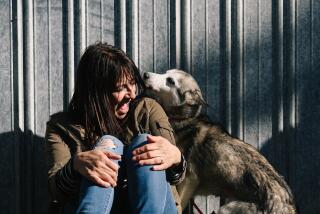The latest shortage? Dogs and cats, as folks foster and adopt pets during quarantine

Emily Bates needed some sort of salve for her growing sense of dread.
Her solution: adopting a terrier mix named Frankie.
Heidi Torres needed a coronavirus distraction for her three children — bored, worried and home from school.
Her answer: fostering Benny, a spaniel mix who’d just been pummeled by a car.
Liz Bridges, far from her Pasadena home, just needed a pal.
So, she took home a 4-week-old stray puppy who was being kept alive — barely — by monks on the streets of Talpe, a tiny beach town in southern Sri Lanka.
Across Los Angeles and around the world, in fretful and uncertain times, it sometimes seems as though every cat and mutt is now a therapy pet.
“Dogs are such healers,” said Namiko Ishii-Danganan, who just fostered a blue nose pit bull named Sky. “She’s a great distraction … the biggest love bug ever.”
Shelter and rescue organizations nationwide are reporting unprecedented interest in fostering and adopting as people who are sheltering in place turn to kittens and puppies, dogs and cats, and here and there a rabbit, for comfort during the coronavirus crisis.
Amid the lockdown, a restless and hard-headed nation has discovered that what it really needs right now is a snuggle and a slurp.

“We are being inundated with offers to foster kittens and are also seeing a sharp increase of interest in adopting,” said Ben Lehrer, president of Kitten Rescue, which has been placing stray kittens and cats across Los Angeles for 25 years.
Shelters and rescue groups report an upsurge of interest in adopting and fostering pets during the coronavirus crisis. Here’s a resource list.
Kristi Labrenz Galvan, who runs the CatCafe Lounge, a shop full of available cats and coffee (currently open only for adoption services) in West Los Angeles, reports a similar surge. “We’ve had so many adoptions…. It’s been so great.”
Jack Hagerman, vice president at the Pasadena Humane Society, reports a “massive uptick” of interest, adding that within a week or so of his group sending out its first plea for foster volunteers March 12, “we’ve had 1,451 people come forward wishing to foster a shelter pet,” with all 124 animals that were available currently placed. “Wow. Just … wow.”
Thinking of checking out one of the locations run by Los Angeles Animal Services, one of the largest municipal shelter systems in the country? “If people want a small dog, we have only a few at this time,” said Agnes Sibal-von Debschitz, a representative for the agency.
A new addition to a household can ease anxiety, allowing people to focus on something other than the pandemic. Nikki Weingarten, a La Cañada Flintridge family and marriage therapist, says a new pet “represents hope.” They can be especially helpful for people who live alone, and when it comes to families with kids, the message is, “We’re getting this pet, life goes on, everything will work out OK.”
Fostering was already on the rise across the country, and experts say that about half of all fostered pets end up as permanent residents of their foster homes. But the thoroughness of some animal fostering protocols (and adoption procedures as well) inspired now-familiar complaints from prospective pet parents, who suggested it was easier to qualify for a mortgage than to adopt a cat or dog.
Shelters and rescue groups report an upsurge of interest in adopting and fostering pets during the coronavirus crisis. Here’s a resource list.
Staffers at shelters and rescue groups insist the red tape has been cut in recent years. And in the last few weeks, with interest skyrocketing, the procedures have been further streamlined as organizations scramble to place pets in homes, knowing they would soon have to get by with only skeleton staffs. (Animals in need of special care were a priority.) Groups increasingly turned to online applications and confirmations.
“I was shocked at how quickly it happened,” says Bates of her adoption through Little Angels, a popular rescue group. “I think it was a little bit different because everyone was working from home.”
“We’ve rescued but we’ve never fostered,” said Torres, who took Benny after he’d been struck by a car and suffered a broken pelvis. “We got the call, and in a couple of hours we had him.”
At first, they had to carry Benny everywhere, but lately, he’s getting around on his own as he heals.
“I kept telling the kids what a good example he is,” said Torres, who lives in La Cañada Flintridge and is mother to Graysen, 12, Jakob, 16, and Maddie, 19. “I feel like he’s taught us lessons.
“And he’s just so sweet.”
The stories of fostering and rescues come from near and far. Bridges adopted the dog she named Ruby from the streets of tiny Talpe, Sri Lanka, where the rules of the lockdown allowed the beach town’s residents out to shop only every three days. She was holed up in Talpe with her boyfriend as they waited to launch a backpacking business.
“I couldn’t imagine this without her,” Bridges said in an email, adding that Ruby was initially covered with fleas and ticks. “She’s keeping me mentally and physically occupied through everything, and I couldn’t be happier that she was dropped into our hands.”
In Chicago, dental student Jenna Kirk took advantage of an extended spring break to bring home Honey, a 5-pound poodle pup with eyes like a Christmas toy.
“I have all day to spend with her now,” said Kirk, 29. “I can adapt to her schedule and she can adapt to mine.”
For Sandra Sempowicz, who recently lost her husband of 36 years, having her recently adopted dog, Bob Dylan, around to comfort her during the quarantine has been a salvation.
“One day, we did five walks,” said Sempowicz, who also lives in Chicago.
The booming interest in pets could hardly come at a better time; March is typically kitty and puppy season, when the rate of births among stray animals explodes. Experts say the season is running a little late this year, although they admit their ability to get a count has been hindered by the pandemic.
The later the season starts, the greater the boom, Hagerman said, which could set the stage for an even more robust — and troubled — season a year from now, particularly for kittens. Rescue operations such as Kitten Rescue are also concerned about the long-term implications of the economic downturn and how it will affect the donations and grants that sustain them.
With so many organizations involved, the procedure for moving an animal into a home varies, but typically, the flow runs this way:
Shelters, often public facilities, take in strays and abandoned pets. In some municipalities, animals may eventually be euthanized, but the city of Los Angeles has a no-kill policy, though even that means some animals often need to be put down.
Animals that aren’t adopted directly from a shelter are sometimes taken by rescue organizations, often small private nonprofits, that place them in the homes of volunteers, or those who have been cleared to foster.
During those transfers, organizations are now taking steps to limit human-to-human contact and allow for social distancing, using crates for dogs and cats and doing the exchanges outside the facilities when possible.
The process of fostering or adoption doesn’t always go smoothly. Shelters and rescue groups work to help prospective owners understand that pets require more than “just food and a litter box.”
“A lot of people don’t know, they think it’s easy,” said Cristin Tamburo Coll, a feline behavior consultant who works with CatCafe and the Stray Cat Alliance. “Just like humans, cats are all very different. They need toys, and something to scratch. Believe it or not, they get bored.”
Kitty Block, who heads the Humane Society of the United States, urges those considering a foster pet to ask about a facility’s policy on veterinary care. Many shelters and rescues provide it free of charge, but the details should be confirmed before committing. Many also provide food, treats and even toys and loaner crates to foster families, Block said, but that varies and should also be discussed ahead of time.
And experts want to remind anyone looking at a pet that even though we are staying home, if restrictions ease in the future and people return to work and school, animals will continue to need attention and care.
For now, new pet parents say they are grateful for the companionship and all the intangibles that a dog or cat brings to their lives.
“I just think of that phrase: ‘A house is not a home without a dog,’” says Ishii-Danganan, who found Sky through the Watts Project, a busy South Los Angeles rescue group. “I’m glad to foster and save a life.”
More to Read
Start your day right
Sign up for Essential California for news, features and recommendations from the L.A. Times and beyond in your inbox six days a week.
You may occasionally receive promotional content from the Los Angeles Times.







